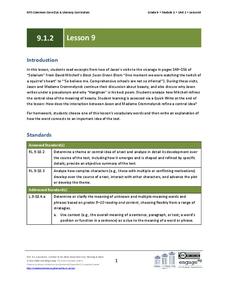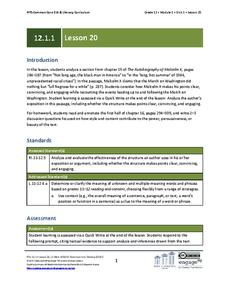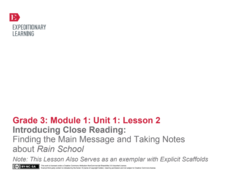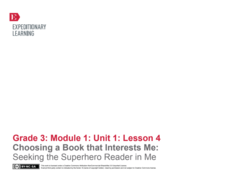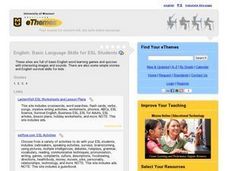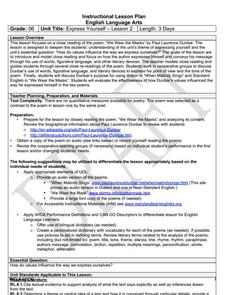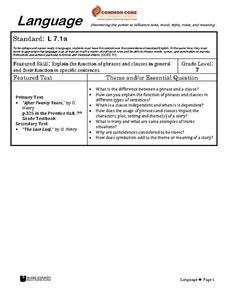One Stop English
A Lesson on Register
The classroom might not be the best place for informal language, but it's a great place to teach middle and high schoolers how to identify the correct language register for their audience. A short instructional activity on formal and...
August House
The Ogre Bully
English language arts, math, science, dramatic arts, and cooking; this lesson has it all! In this multidisciplinary resource, your scholars will take part in a read aloud of The Ogre Bully by A.B. Hoffmire and have a grand...
EngageNY
Grade 9 ELA Module 1: Unit 3, Lesson 5
Class members continue their study of Romeo and Juliet by watching scenes from Baz Luhrmann’s Romeo + Juliet and then examining the figurative language Shakespeare uses in Act 1, scene 5, lines 92–109 when Romeo and Juliet meet at the ball.
EngageNY
Grade 9 ELA Module 2, Unit 2, Lesson 3
The manipulation of time is one of the most essential elements in Sophocles' Oedipus the King. As your language arts class participates in a jigsaw discussion activity, they work together to analyze the play's plot structure and...
EngageNY
Grade 9 ELA Module 1, Unit 2, Lesson 9
Class members continue their discussion of David Mitchell's Black Swan Green, focusing on how the author uses the conversation between Jason and Madame Crommelynck to refine his central idea of the meaning of beauty.
EngageNY
Grade 9 ELA Module 2, Unit 3, Lesson 13
Using the open-ended discussion questions developed the day before, class members engage in a fishbowl discussion of the three texts that anchor the unit: “True Crime: The Roots of an American Obsession," “How Bernard Madoff Did It,” and...
EngageNY
Grade 9 ELA Module 1: Unit 3, Lesson 4
Class members watch the clip of Baz Luhrmann’s Romeo + Juliet in which Benvolio persuades Romeo to go with him to the Capulet ball to see Rosaline. Pairs then examine Act 1, scene 3, lines 64–100, and consider how Shakespeare develops...
EngageNY
Grade 9 ELA Module 1: Unit 3, Lesson 11
The study of Romeo and Juliet continues as pairs use the provided summary tool worksheet to record evidence of how Shakespeare uses dramatic irony to heighten the tension in Juliet's soliloquy in Act 3, scene 2, lines 1–31.
EngageNY
Grade 11 ELA Module 2: Unit 1, Lesson 24
You can never be too prepared. Scholars begin preparing for the end-of-the-unit assessment of Du Bois’s "Of Our Spiritual Strivings" and Washington’s "Atlanta Compromise" speech. They use peer discussion to discuss the relationship...
Curated OER
Tears of Joy Theatre Presents Anansi the Spider
Accompany the African folktale, Anansi the Spider, with a collection of five lessons, each equipped with supplemental activities. Lessons offer multidisciplinary reinforcement in English language arts, social studies, science,...
EngageNY
Mid-Unit 3 Assessments, Part 2: Summarizing, Analyzing and Discussing Research
Why is reading important? As part of the mid-unit assessment, scholars read, summarize, and analyze an article about the importance of reading. Additionally, they continue their discussion about whether their rules to live by should be a...
EngageNY
Science Talk: How do Bullfrogs Survive
Following the reading of the book Bullfrog at Magnolia Circle, the ninth lesson in this unit involves emerging experts in a science talk about how bullfrogs survive. Looking back through the text, young scholars prepare for the...
EngageNY
Grade 12 ELA Module 1: Unit 1, Lesson 20
The March on Washington takes center stage in the discussion of chapter 15 of The Autobiography of Malcolm X; however, class members are presented with an entirely different view of the march from the ones they have previously studied....
EngageNY
Introducing Close Reading: Finding the Main Message and Taking Notes About Rain School
This second lesson in a larger unit is perfect for the beginning of the year because it explicitly teaches 3rd graders how to use close reading skills by identifying unfamiliar words, figuring out the gist, and defining important...
EngageNY
Choosing a Book That Interests Me: Seeking the Superhero Reader in Me
Selecting a "power book" and engaging in a structured class discussion are the learning targets for this fourth lesson in a larger unit. It is designed as a beginning of the year unit for establishing norms and routines in the classroom....
Curated OER
All in a Day's Work
Who is Herman Melville? Read and discuss "Bartleby the Scrivener: A Story of Wall-street." Then, discuss the film adaptations of Melville's work and translate a passage of the text into modern-day English. Discussion questions are...
Curated OER
Emotions and Social Skills
Kindergarteners discuss emotions and social skills as the start to this lesson. Then they demonstrate what emotions they feel while participating in a role play. This lesson plan also calls for group work in which learners show...
Curated OER
English: Basic Language Skills for ESL Students
Students use the Internet to help them with their language skills. They can read simple stories and play word learning games.
Curated OER
6th Grade: Express Yourself, Lesson 2: Close Read
The second lesson of a pair about Paul Laurence Dunbar, this plan focuses in particular on his poem, "We Wear the Masks." After a short historical introduction, class members conduct a series or readings, marking up the text and...
Achieve3000
Context Clues and Idioms
Kids practice using five types of context clues (definition, synonym, antonym, example, and general) to decode idiomatic language.
Wake County Public Schools
Language
Have your class doing everything from reading literature, analyzing literary devices, identifying independent and dependent clauses, discussing, and writing creatively with the rich resource found here. After a mini lesson on independent...
Film English
Two Fingers
Ask your class to think about how song lyrics can go with a video and more with a well-sequenced lesson plan that focuses on the song "Two Fingers" by Jake Bugg. Class members work together to make predictions about the content of the...
Curated OER
Comprehension Skills: Evaluate Using Fiction Stories and Aesop's Fables
Primary readers investigate several comprehension skills in the ten lessons of this unit. Forming opinions about stories, comparing stories to each other, using Venn Diagrams, and applying the ideas from a story to real life situations...
Curated OER
Shakespeare's Othello and the Power of Language
Students read and analyze Iago's rhetoric in specific monologues and dialogues with other characters, examine what Iago says and how he says it, define some basic rhetorical terms, and discover the sometimes dangerous power of language.






